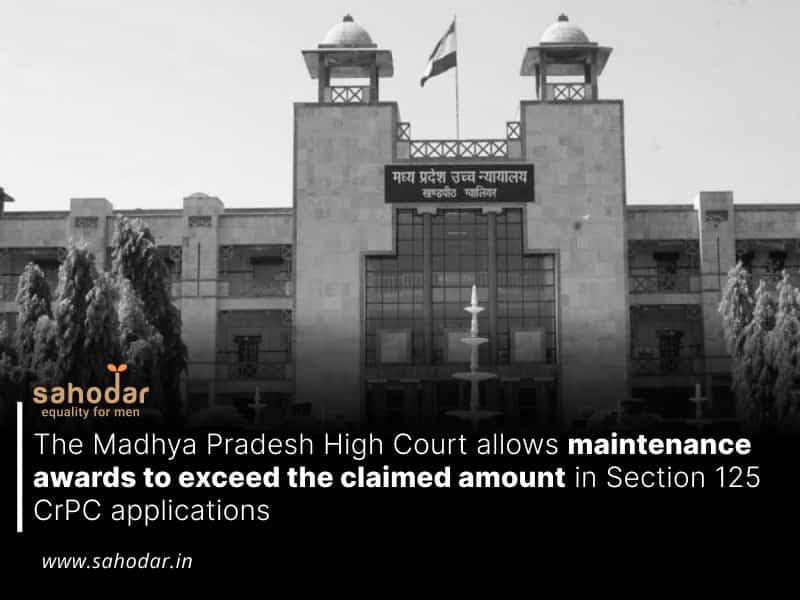The Madhya Pradesh High Court, in its pronouncement, articulated that there exists no statutory constraint precluding a court from adjudicating maintenance in excess of the quantum asserted in a Section 125 Criminal Procedure Code (CrPC) application. This doctrinal exposition materialized during the adjudication of a Criminal Revision Application by the Indore Bench, wherein a petitioner, contesting a maintenance order emanating from the Trial Court, found his plea dismissed.
Moreover, the Court explicated that the Appellate Court ought not to interpose in a maintenance decree issued by the Trial Court solely by virtue of the fact that the subject minor offspring attained majority subsequent to the initiation of the aforementioned legal proceedings.
The Bench of Justice Prakash Chandra Gupta observed, “However, it appears that in changed circumstances, the applicants have been rightly awarded maintenance amount, more than claimed amount”
Advocate Arihant Kumar Nahar appeared as counsel for the Applicants, comprising the Wife and minor Son, whereas Advocate VK Jain represented the Respondent, denoted as the Husband/Non-Applicant.
The judicial proceedings were instigated upon the initiation of a maintenance application pursuant to Section 125 of the Code of Criminal Procedure (CrPC) by the wife. Allegations included dowry demands and physical abuse by the husband. Moreover, the wife asserted her absence of personal income, juxtaposed with the husband’s monthly earnings of Rs. 8,000 in his capacity as a railway employee. The husband contested these claims, asserting the wife’s voluntary departure from the matrimonial abode without justifiable cause. Additionally, he posited that she garnered a monthly income of Rs. 10,000 through private tutoring and a beauty parlor.
Upon due consideration of the financial particulars, the Trial Court determined the wife’s income at Rs. 3,000 per month and the husband’s net income at an excess of Rs. 21,000 per month. Consequently, the Trial Court rendered a judgment, mandating a monthly maintenance of Rs. 3,000 for the wife and Rs. 4,000 for their minor son. Dissatisfied with the verdict, the Husband sought recourse in the High Court, thereby challenging the Trial Court’s adjudication.
The court, in its scrutiny, observed that at the initiation of the application, the minor son was statutorily entitled to maintenance from the father pursuant to Section 125 of the CrPC. However, due to the son attaining majority during the pendency of the revision petition, the husband is now vested with the prerogative to seek maintenance through the appropriate channels before the Trial Court.
It was further noted by the court that the antecedently withdrawn application under Section 125 of the CrPC, unadjudicated on its merits, does not attract the doctrine of Res Judicata.
Additionally, the Bench accorded credence to the veracity of the wife’s testimony, positing that the applicants demonstrated legitimate grounds for maintaining separate residence from the husband. Given the wife’s financial constraints in supporting herself and the dependent child, juxtaposed with the husband’s gainful employment within the railway sector, the court expounded that the husband bears both a legal and moral obligation to furnish financial maintenance to the applicants.
“Apart from that if it is presumed that one sister and mother is dependant on non-applicant, then too the present applicants are wife and son of the present applicant. It also appears that the non-applicant works in railway department and has sufficient source of income and thus he has legal and moral obligation to maintain the applicants. Therefore, the learned trial court has rightly held that the non-applicant has sufficient source of income and hence is liable to maintain the applicants”, the Bench noted.
With respect to the matter of awarding maintenance exceeding the initially claimed sum, the Court took cognizance of a substantial augmentation in the husband’s income subsequent to the initiation of the maintenance application. Consequently, the Court deemed the Trial Court’s decision to grant an amount surpassing the initially claimed figure as well-founded.
In alignment with this determination, the Court rendered a dismissal of the Application.

